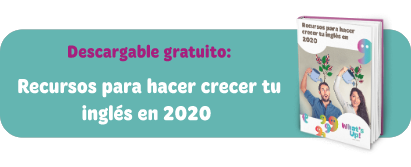What's Up! blog
el mejor contenido del mejor curso de inglés
Los phrasal verbs imprescindibles con el verbo “to get”
Los phrasal verbs son probablemente el aspecto más odiado por los estudiantes de inglés. Es difícil aprenderlos todos y muy fácil equivocarse.
Puedes no utilizarlos, claro, olvidarte de que existen y usar otros verbos en su lugar, pero ¡los nativos los utilizan constantemente en las conversaciones!
Hoy os traemos una pequeña lista con los phrasal verbs que se forman con el verbo “to get”, uno de los más utilizados.
Get up
Probablemente, el más conocido de todos, significa levantarse
Ejemplos:
I get up very early every day
Get up from the sofa
I get up at seven o’clock
Get up, it’s late!
Get along
Este phrasal verb significa llevarse bien con alguien y suele ir seguido de with
Ejemplos:
They don’t get along
I get along very well with Mary
We have got along since the day we met
Jack doesn’t get along with his boss
Get over
Significa recuperarse de algo, ya sea algo físico, como una enfermedad o una mala experiencia
Ejemplos:
She hasn’t got over the accident yet
I hope you get over your flu quickly
It was difficult for them to get over their break up
He is still getting over losing his job
Get away
Significa alejarse de algo o de alguien o escapar. También se usa coloquialmente como ¡anda ya!
Ejemplos:
I like to get away from the city from time to time
Mary managed to away from the thief who was stealing the bank
Please, get your dog away from me!
You won the lottery? Get away!
Get through
Este phrasal verb tiene dos significados distintos, dependiendo de lo que vaya detrás. Por un lado, significa acabar con algo lo antes posible, en este caso va seguido de with.
Ejemplos:
I finally got through with the report
I need to get through with it as soon as possible.
En su otra acepción, significa comunicarse con alguien o, de manera figurativa hacer que alguien entienda algo. En este caso, va seguido de to.
Ejemplos:
I am trying to get through with Ms. Smith, but she is not answering my phone calls.
The teacher tried unsuccessfully to get through to his students.
Get back
Significa volver a un lugar donde se estuvo antes, o recuperar algo.
Ejemplos:
After a year working overseas, I finally got back home.
I got my wallet back after I lost it last weekend.
Get in/into y get out
Estos dos phrasal verbs tienen significados opuestos, el primero significa entrar a un lugar, el segundo, salir de un lugar.
Ejemplos:
Get into the car, it’s freezing!
I don’t want to get in trouble
I just got out of work
Get out of here!
Get off
Significa bajarse de algún lugar o medio de transporte
Ejemplos:
I’m getting off the bus in the next stop
Could you please help me get off this ladder?
Get off the tree or you’ll hurt yourself!
Get by
Significa apañarse o arreglárselas.
Ejemplo:
I’ve learnt to get by with a smaller income
Don’t worry, you will get by fine without her
How will you get by on your own?
Esperamos que no hayan sido demasiados phrasal verbs para un día, ¡ya veréis como con la práctica los vais aprendiendo y os sale de manera natural!
Post relacionados:



